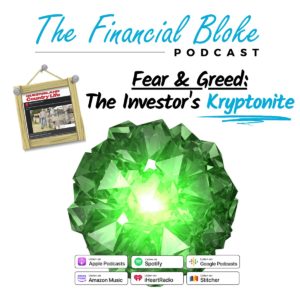Warren Buffet, one of the greatest investors of all time, famously said "Be fearful when others are greedy and greedy when others are fearful." This timeless wisdom reminds us that allowing fear to dominate our investment decisions is a sure-fire path to failure.
Fear is often the biggest obstacle to making sound investment decisions. The fear of losing money and the fear of missing out, can paralyse us and prevent us from making rational choices. Equally, it can also lead us to make hasty decisions without proper consideration, simply to avoid missing out. In both cases, emotions can drive us to make poor investment choices.
However, if we can learn to overcome our fears, exercise patience, carefully consider the options, and act with confidence, our chances of success are immeasurably better.
The challenge is that sometimes we need to be bold in the face of market fluctuations. When others are caught up in the excitement of a bull market, Buffet advises caution and risk assessment. When others are panicking during a bear market, he suggest that might be the time to seize the opportunity to buy undervalued assets. Either way, at the core of his philosophy the requirement for investors to think carefully, do their research and act without emotion, which is extremely difficult - especially for those new to the game of investing.
Going against the herd mentality (a contrarian investment strategy) takes courage and requires us to make decisions that others are too afraid to make. This courage is often what distinguishes successful investors from unsuccessful ones.
Fear and greed are the two most powerful emotions driving market behaviour. Greed drives investors to overpay for assets, while fear drives them to sell assets for less than they are worth. By recognizing the impact of these emotions on market dynamics, we can use them to our advantage. When others are greedy, we can wait for the market to correct itself. When others are fearful, we can seize the opportunity to buy undervalued assets.
Of course, this is easier said than done! Being a successful contrarian investor requires discipline, patience, and skill. It involves a deep understanding of market dynamics, a sound investment strategy, and effective risk management.
And even if you act without fear and take well thought out action, things might not work out as you planned. As an investor, you need to accept that courage when investing doesn’t guarantee success, it’s just a superior strategy that improves your chances over being a slave to fear.
If we can learn to be stoic in the face of market fluctuations and act with conviction, we can achieve tremendous success in our investments. So, create a plan, and the next time the market behaves irrationally, remember Buffet's quote and be ready to seize the potential opportunity.
Cheers, Ben
----------------------
Disclaimer: The information contained in this column is general in nature and for education purposes only. It is not financial advice. No one should act on the information without appropriate specific advice for your particular circumstances. Ben Law is a former financial advisor but is no longer licensed and cannot and will not give you specific or personal advice in this column.

